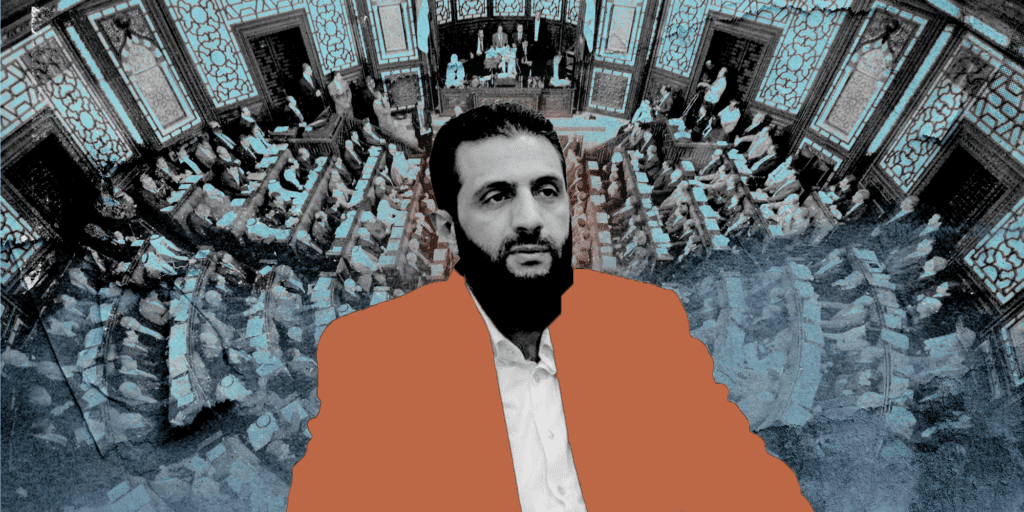The idea of a “one-color government” — a single-party dominance over the executive branch — is not inherently flawed, particularly in a deeply divided nation like Syria, fragmented by layers of sectarian, ethnic, and political divisions. Such a government offers potential advantages, including efficiency and stability. However, it also carries risks, notably the danger of authoritarianism. This article examines the merits and pitfalls of a one-party executive and its potential role in Syria’s transitional governance.
Sharaa’s Meeting with SDF Leadership Focused Solely on Military Matters
While the concept may appear antithetical to democratic ideals, a single-party government can provide decisive leadership, particularly in post-conflict settings. The victors of Syria’s civil war, instead of forming an inclusive coalition or maintaining the existing technocratic government with minor adjustments, chose to establish direct governance. Though controversial, this approach can offer benefits:
- Efficiency in Decision-Making:
A one-party government circumvents the delays inherent in coalition negotiations, allowing for rapid response to crises. In Syria’s case, a transitional government with broad representation would face prolonged, contentious discussions, impeding progress on urgent matters such as reconstruction, refugee repatriation, and economic stabilization.
- Stability and Continuity:
Unified governance prevents the policy reversals and unpredictability that often plague coalitions. Consistent leadership can foster a stable political and economic environment, attract investment, and enable long-term planning in critical sectors like infrastructure and healthcare.
- Policy Cohesion:
Without the distractions of partisan disputes, a one-party government can articulate and execute a clear, focused vision. Historical examples, such as China’s economic and technological advancements under a unified executive, illustrate how such systems can achieve significant development goals.
Checks and Balances: The Pillars of Accountability
A one-party government, however, must operate within a framework of robust checks and balances to avoid descending into autocracy. These mechanisms include:
– Independent Judiciary: Ensuring legal compliance, safeguarding rights, and restraining executive overreach.
– Free Press: Acting as a watchdog to expose corruption and hold leaders accountable.
– Vibrant Civil Society: Providing citizens a platform to influence governance and foster public engagement.
These safeguards are critical for maintaining transparency, protecting rights, and preserving public trust.
The Reality of Syria’s Current Governance
While the potential advantages of a one-color government are evident, their realization in Syria faces significant obstacles. The current administration, led by Ahmad al-Sharaa, lacks the foundational elements of democratic accountability:
- Absence of Legislative Oversight:
Governance relies solely on executive orders, with no parliamentary body to review or counterbalance decisions.
- Dysfunctional Judiciary:
The legal system remains riddled with corruption and inefficiency, unable to provide meaningful oversight.
- Freedom of Press and Civil Society:
Despite systemic flaws, Syria’s press and civil society retain a degree of autonomy, offering a foundation for future reforms. However, these institutions are fragile and require protection to thrive.
The Challenges of Inclusivity
The feasibility of a one-color government in Syria is further complicated by its diverse societal fabric. Syria’s Sunni Muslim majority is not a monolithic entity but a mosaic of urban, rural, secular, and religious communities, each with distinct perspectives and priorities. Imposing a single ideological framework risks alienating large segments of the population and undermining social cohesion.
Moreover, the exclusionary tendencies of the current administration and HTS raise concerns about their ability to foster inclusivity. Without broad-based participation and representation, the government’s legitimacy and effectiveness remain in question.
Toward a Democratic State
For Syria to achieve long-term stability and prosperity, governance must be rooted in principles of equal citizenship, active partnership, and the rule of law. A democratic state should guarantee freedoms of belief, expression, and assembly, while empowering civil society and ensuring civilian oversight of military and security institutions.
Efforts to impose a rigid, one-dimensional vision on Syria are unlikely to succeed. The resilience of Syrian society, characterized by its inherent diversity and civility, will resist such attempts. The path forward lies in fostering inclusivity, upholding rights, and building a system of governance that reflects the aspirations of all Syrians.
Syrians must balance two critical tasks: supporting the transitional government to ensure stability while exerting pressure to prevent the extension of its mandate. The international community, too, has a role in encouraging inclusive governance and providing oversight to uphold democratic principles.
The envisioned Syrian state must transcend narrow ideologies, embracing diversity as a strength. It must champion equality, justice, and dignity for all its citizens, creating a society where freedoms are protected, and governance is inclusive.
The bottom line is that a one-color government, when implemented with robust safeguards, can provide efficient and stable governance. However, without accountability and inclusivity, such a system risks exacerbating divisions and fostering authoritarianism. Syria’s future depends on its ability to strike a balance between decisive leadership and democratic principles, ensuring that all citizens—regardless of background—have an equal stake in rebuilding their nation.


